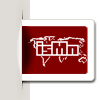Dear ISMN agencies,
in this year the AGM and Panel Meeting of the International ISMN Agency will take place in São Paulo, Brazil on Thursday, 18 September 2025 in the meeting rooms of Câmara Brasileira do Livro (CBL).
The ISMN AGM and Panel meeting is scheduled on Thursday, 18 September, starting at 10:00 am (check in at 9:30 am), finishing in the early afternoon at 1:30 pm.
Please note: it will be a in-person-meeting only (no live stream).
The International ISMN Agency can provide letters of invitation for any delegates of the national ISMN Agencies who would like to attend the AGM. In case you require a letter of invitation, please write to ismn@ismn-international.org.
The Board of the International ISMN Agency is looking forward to welcome you in São Paulo in September this year!
